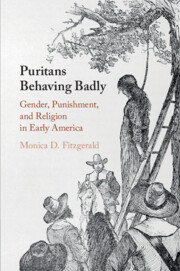Book contents
- Puritans Behaving Badly
- Puritans Behaving Badly
- Copyright page
- Dedication
- Contents
- Figures
- Tables
- Acknowledgments
- Introduction
- 1 The Great Hen Squabble and Regulating the Godly Path
- 2 Drunkards and Fornicators on Meeting House Hill
- 3 “Wicked Tongues and Wayward Behavior”
- 4 A “Blubbering” War Hero and the Middle Ground of Masculinity
- 5 “Unquiet Frame of Spirit”
- Conclusion
- Bibliography
- Index
3 - “Wicked Tongues and Wayward Behavior”
The Language of Confession
Published online by Cambridge University Press: 02 May 2020
- Puritans Behaving Badly
- Puritans Behaving Badly
- Copyright page
- Dedication
- Contents
- Figures
- Tables
- Acknowledgments
- Introduction
- 1 The Great Hen Squabble and Regulating the Godly Path
- 2 Drunkards and Fornicators on Meeting House Hill
- 3 “Wicked Tongues and Wayward Behavior”
- 4 A “Blubbering” War Hero and the Middle Ground of Masculinity
- 5 “Unquiet Frame of Spirit”
- Conclusion
- Bibliography
- Index
Summary
Chapter 3 explores the language of confessions to explain how language affected religious practices. Ministers expected all confessions to use a feminized language of submission and humility. However, laymen diverged from the language prescribed by the clergy to accept a more masculine language for male confessants. In the public space of the meetinghouse, where laymen confessed their sins, they could not risk their masculine reputations by adopting a feminized verbal order espoused by the clergy. Women were the normative Puritans who fully adopted the language and demeanor of a feminized faith. Men created a more masculine verbal order that focused on their behavior instead of their souls. Through this practice, the disciplinary process reinforced male duty and female piety, which ultimately gendered Puritanism.
Keywords
- Type
- Chapter
- Information
- Puritans Behaving BadlyGender, Punishment, and Religion in Early America, pp. 69 - 94Publisher: Cambridge University PressPrint publication year: 2020

